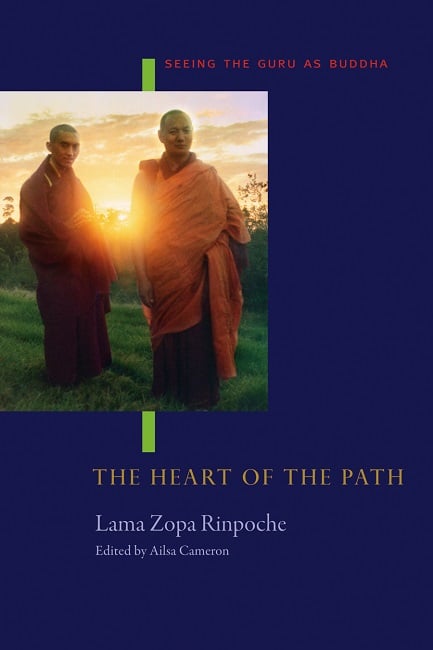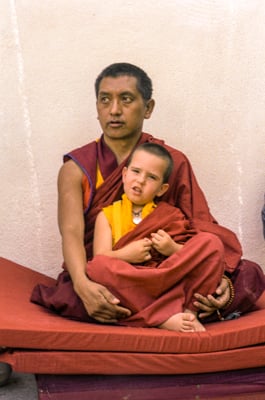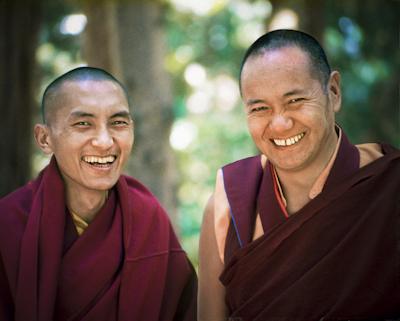Dear LYWA Friends and Supporters,
Thank you for receiving our monthly e-letter. Please do share it with others.
Our Latest Book! Our new book, Lama Zopa Rinpoche’s The Heart of the Path, is now available to be ordered! This is an amazing book, the best I’ve ever read. In it, Rinpoche really explains the essence of Dharma practice and what we need to do to attain enlightenment for the sake of all sentient beings.
Our new book, Lama Zopa Rinpoche’s The Heart of the Path, is now available to be ordered! This is an amazing book, the best I’ve ever read. In it, Rinpoche really explains the essence of Dharma practice and what we need to do to attain enlightenment for the sake of all sentient beings.
If you are an LYWA member we will be sending it to you automatically, wherever in the world you are. (Note that if you've moved recently, please send us your new address.) If you are not a member, please consider joining up—members automatically get all new Lama Yeshe or Lama Zopa Rinpoche books published by Lama Yeshe Wisdom Archive or Wisdom Publications.
If you cannot become a member at this time, please do yourself a favor and buy this book. We have purposely priced it low ($20 for a 512-page book) to make it accessible for all.
Big Love, Lama Yeshe's Biography
I want to thank most sincerely all those who have responded to our appeal for funds for our forthcoming Lama Yeshe biography, Big Love. If you missed it in our previous e-letter, please check it out for details and help if you can. As mentioned before, excerpts from the biography are being posted as the book is edited. We expect this monumental work to cost around $100,000 to create and print so if you would like to contribute, please do so here.
We are almost totally reliant upon your kind contributions to bring the Dharma to thousands of people all over the world and we thank you for your support from the bottom of our hearts.
What's New on the Web
We are continuing to add video clips to our website. You can watch excerpts from the latest Lama Yeshe video Bringing Dharma to the West and also from Lama's Offering Tsog to Heruka Vajrasattva. We welcome your feedback on this new website feature.
We have also posted the audio recordings from two of Lama Zopa Rinpoche's events from 2003. The first is teachings on The Eight Verses of Thought Transformation given at Tse Chen Ling Center in San Francisco. The second is teachings from the Maitreya Retreat held at Root Institute in Bodhgaya. As is the case with most of our online recordings, you can listen online and follow along with an unedited transcript. We now have almost 200 hours of freely-available audio posted on our website!
By special request we transcribed and edited an excerpt from Rinpoche's teachings at Amitabha Buddhist Centre in Singapore last month, so we decided to post the transcript and accompanying audio on our site as well.
And, finally, we have posted the html version of this classic text which previously was only available online in pdf format: Rinpoche's The Wish-Fulfilling Golden Sun of the Mahayana Thought Training. Now you can read and search this book as you can with all the other teachings on our site.
Update on Member Benefit
For some time we have been offering our DVDs to our Members at a 50% discount. We recently sent an email to all members with instructions for how to obtain this discount. If you are a member and haven't received this email, please let us know. We will be happy to update your email address in our records.
Thank you so much. This week we leave you with a wonderful teaching by Lama Zopa Rinpoche on the nature of the mind.
Much love,
Nick Ribush
Director
Continuity of Consciousness
 There are different levels of happiness that can be achieved: the happiness of this life, which means everyday peace of mind, and happiness after this life. The question is, does this life determine future-life happiness? The answer depends on whether there is continuation of consciousness, or mind, after this life. We have to analyze whether or not consciousness continues beyond this life.
There are different levels of happiness that can be achieved: the happiness of this life, which means everyday peace of mind, and happiness after this life. The question is, does this life determine future-life happiness? The answer depends on whether there is continuation of consciousness, or mind, after this life. We have to analyze whether or not consciousness continues beyond this life.
Study of the mind is very important, especially study of what happens to it at birth and death. If we have clear and complete knowledge of the mind, we will also understand how physical phenomena exist. As long as we don’t know about the mind, especially about what happens to it at birth and death, our understanding of the conventional and ultimate nature of physical phenomena will also be limited.
In Buddhism, the mind is the most important and most extensive field of study. One part of our mind creates all our problems; another part brings us all our happiness. By understanding even the conventional nature of the mind, we can help other sentient beings more, and not only in the short term. This knowledge enables us to offer others long-term benefit.
However, complete understanding of the mind comes only if you study the tantra of Tibetan Mahayana Buddhism. By knowing about tantra and actualizing the tantric path, from your own experience you get a complete and exact understanding of not only the gross mind but also the subtle ones.* You can understand the subtle mind only by studying tantra, and especially by practicing it. You then see clearly what the mind is and what you can do to offer great benefit to yourself and to all sentient beings. When you see the incredible potential that your mind has, you feel so much hope and joy.
Mind is a very extensive subject, actually much vaster and deeper than that of physical objects, even though it looks as if it is the other way around. The mind itself is formless, colorless, and shapeless, but has the characteristics of clarity and the ability to perceive objects. This is the general definition of mind. In other words, mind is a formless phenomenon that knows things.
There are six primary minds, or consciousnesses: the mental consciousness and the five sense consciousnesses (consciousness of the eye, ear, nose, tongue, and body). The mental consciousness mainly discriminates the meaning of objects, whereas the senses mainly discriminate the qualities of objects. That is a rough explanation of the different functions of consciousness. It is the mental consciousness that continues from life to life. The other five consciousnesses do not go from one life to another.
The mental consciousness is also the one that allows us to reflect on what we did this morning, yesterday, last year, or since our birth. After our senses have had contact with something, after we have heard, seen, smelt, tasted, or touched something and experienced some feeling from that contact, it is the mental consciousness that remembers the experience.
There are many people, young and old, in the East and in the West, who can remember their past lives, who can see these lives. For example, a few years ago in India, a seven-year-old girl took her present-life parents to see her past-life family and showed them around the house. She could remember everything about her past life and actually felt closer to her past-life parents, who are old and poor, than to her present parents, who are young and quite wealthy. I had a photograph of her standing with both her families, past and present. Such things happen quite often, in various places.
When people with clear memories and few obscurations imagine going back from today to yesterday, to last year, to their childhood, they can remember back to being in their mother’s womb, and even to their consciousness taking place on the fertilized egg. Trying to see back beyond that, some people can see, for example, that they were in a house in Tibet and what they were doing. Many people can see such things very clearly. It is very real to them.
Some people are also able to see past and future lives because they have developed their mind through meditation. When the mind is more advanced, with greater inner knowledge and a greater capacity to perceive phenomena, a person is able to see things that we do not see, such as past and future lives. Through inner development, they are able to perceive many phenomena that we are not aware of now. By meditating on the nine levels of calm abiding or on the Six Yogas of Naropa or other tantric practices and attaining high levels of the path, you can develop clairvoyance and see many hundreds of your own past and future lives, and also those of others.
There are many people who remember past lives. Now, if you yourself don’t see past or future lives, it doesn’t mean that they don’t exist. There are many things from this life, and even from today, that you don’t remember. Sometimes you can’t remember things you did or said this morning. There are many places you have been, people you have seen, and things you have done in this life that you don’t remember. There are many things you have experienced but you don’t remember.
You also don’t remember coming out of your mother’s womb. Why do you say that a particular man is your father and a particular woman is your mother? It’s not because you remember your consciousness taking place on the fertilized egg or coming out of your mother’s womb. When you ask a child, “What makes you believe this is your father and this your mother?” The simple, clear answer they give is, “Because I was told they were.” That is all. You believe these people to be your parents not because you remember everything that happened but because you believed what you were told.
To say that something doesn’t exist because you don’t see it or remember it is contradictory to reality—there are so many things that you don’t know. Many things are not taught during a general education in school or college. A general education doesn’t give much insight into many phenomena, especially not into the mind. You have to discover many things through meditation, through development of your own mind.
You can’t say with one hundred percent certainty that the consciousness does not continue to the next life. You haven’t realized this; nobody in the world has realized that there is no consciousness before and after this life. Even though people hold this philosophy, nobody has actually realized it. But numberless people have realized that there is consciousness before and after this life.
Note:
*There are gross, subtle, and very subtle minds. The gross mind comprises the five sense perceptions. The subtle mind comprises the eighty conceptual minds, which include the six root delusions and twenty secondary delusions. The very subtle mind is the clear light mind, which everybody experiences when they die.
Lama Zopa Rinpoche gave this teaching in Palermo, Italy, 17 July 1990. Edited from the Lama Yeshe Wisdom Archive by Ven. Ailsa Cameron.































